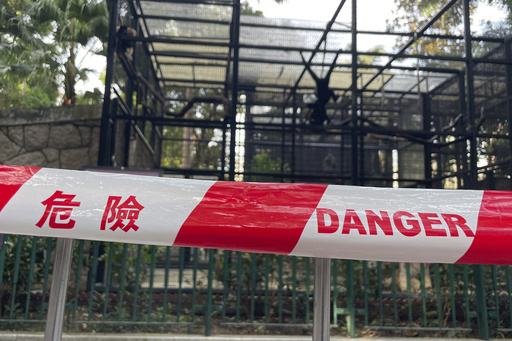
HONG KONG — In a concerning development at Hong Kong’s oldest zoo, nine monkeys succumbed to an endemic disease over the course of just two days this week. Authorities reported on Friday that the unfortunate deaths were linked to melioidosis, a condition that likely stemmed from recent excavation work near their enclosures.
Kevin Yeung, the Secretary for Culture, Sports and Tourism, addressed the media, revealing that the affected monkeys had developed sepsis as a result of the infection. He reiterated that melioidosis is primarily contracted through exposure to contaminated soil and water and reassured the public that there is no significant risk to humans from interacting with infected animals or individuals.
“It’s a sorrowful loss for us with the passing of these nine monkeys,” Yeung stated.
The fatalities involved a De Brazza’s monkey, a common squirrel monkey, four white-faced sakis, and three cotton-top tamarins, the latter being a species listed as critically endangered internationally. Eight of the monkeys were discovered dead on Sunday, while another passed away on Monday after exhibiting peculiar behavior.
According to the local health authority, melioidosis is attributed to the bacterium Burkholderia pseudomallei, which is commonly found in contaminated soils and muddy environments. Yeung highlighted that the deaths might have a connection to recent repair work carried out on irrigation pipes in the vicinity of the monkey habitats, noting that this task was undertaken in early October.
He speculated that the monkeys could have been exposed to the bacteria through contaminated footwear of the park staff, or alternatively, that some of the infected monkeys may have mingled closely with others. “Given that the incubation period for melioidosis in primates is around one week, this aligns with the timeline following the digging operations,” he explained.
Edwin Tsui, who oversees the local health authority, assured the public that the health incident was confined to a specific area, thus minimizing any potential impact on the wider Hong Kong community. Following the deaths, Yeung convened an urgent meeting with representatives from various government departments including the Leisure and Cultural Services Department, the Agriculture, Fisheries and Conservation Department, and the Department of Health.
On a related note, another De Brazza’s monkey was reported to be exhibiting unusual behavior and lack of appetite; however, officials confirmed that the animal’s condition remained stable as of Friday.
The Hong Kong Zoological and Botanical Gardens, which opened to the public in 1871, is a historic site that offers a rare natural refuge in the heart of the bustling Central district of the city. The park stands as a significant landmark since the territory returned to Chinese governance in 1997.
